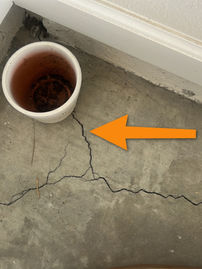What is an 11-Month (Warranty) Inspection?
An 11-month warranty inspection is an evaluation on a newly built home just before the expiration of its one-year builder warranty. This inspection aims to identify any defects or issues that may have arisen since the home was completed. By identifying issues early, homeowners can ensure that necessary repairs are made, protecting their investment and maintaining the home's value.
This inspection focuses on the 5 main elements of a home: foundation, plumbing, electrical, HVAC, and the roof. Your inspector will test these components and systems, and check for proper installation and function.
Foundation

Plumbing
Electrical
HVAC
Roofing
Foundation
Structural Systems: Inspectors will evaluate the home’s foundation, framing, and overall structural integrity. This includes checking for presence of / severity of cracks in walls or ceilings, uneven floors, water intrusion, grading and drainage of the property, erosion of soils, and any signs of settling that could indicate serious foundation issues.

Plumbing
Plumbing System: We will check the pipes, fixtures, and water supply and drainage systems. This includes testing faucets, toilets, and showers for leaks, pressure, and functionality. The inspector checks the age, condition, and operation of the water heater. We will also note water / gas plumbing material and look for signs of corrosion or water damage around pipes or under sinks.
Electrical
Electrical System: Inspectors will examine the electrical panel, wiring, outlets, and light switches and fixtures. They'll check that the system is properly grounded, that wiring appears in good condition, and for exposed wires or signs of electrical hazards (such as outdated panels or circuit breakers, loose wiring or overloaded circuits, etc.).
HVAC
HVAC (Heating, Ventilation, and Air Conditioning): The inspector will evaluate the heat source, air conditioning units, ventilation, and ductwork to ensure they’re functioning properly. This includes checking for any signs of wear, improper installation, mold, moisture, or improper venting. They assess the age and condition of the units and ensure that the systems are functioning properly.
Roofing
Roofing: The roof is carefully examined for any signs of wear, damage, or leaks. Inspectors will look at shingles, flashing, gutters, and the general condition of the roof structure. Any missing or damaged shingles could lead to leaks or water damage inside the home or siding.
This type of inspection is limited because it relies on the knowledge of the homeowner for smaller deficiencies (appliances, lights, cosmetics, etc.) through the experience of living in your home. Your inspector will focus on the main elements and complexities but will document and further investigate your concerns. If you want a full home inspection instead, click here to learn more.
























